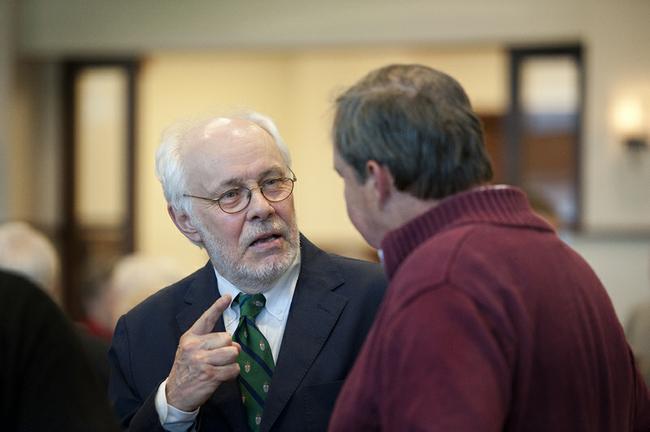
After 16 years of teaching, Peace Studies program director John Galliher has decided to move on.
“Sixteen years later, it just seemed right,” Galliher said.
Along with his director positon, Galliher was a sociology professor. The Peace Studies Program is dedicated to getting students to think about non-violent solutions to critical issues involving the future of humanity.
“It revolves around the simple idea that you should not kill your enemies,” Galliher said. “I think this is one of the most important things the Peace Studies Program is trying to get across. You may have enemies, and most people do, but you don’t kill them.”
This idea resonated strongly throughout all who were in attendance at his reception Thursday evening.
“I love the fact that there are groups of people who want to get a program like this going,” Vietnam War veteran John Betz said. “They teach young people that there are ways that don’t involve killing thousands of people to solve problems.”
As the night’s guest speaker, Betz went on to describe what he called the innovative and thought-provoking teaching style that Galliher brought to the program.
“He invites people to come talk to his classes, which represent every point of view,” Betz said. “He’s had hawkish, pro-war generals and politicians. He’s trying to get people to learn how to think (by giving them) an opportunity to hear points of view that they wouldn’t have had the opportunity to (hear) otherwise.”
Under the administration of Galliher, fellow professor John Kultgen said the Peace Studies Program has grown significantly in popularity at MU.
“Peace Studies has flourished under his leadership,” Kultgen said. “The classes are all well attended, and the number of majors and minors have increased to impressive levels. Most importantly, (he’s helped) send in to the world a sequence of generations of students who are well-informed and ardent in the cause of peace.”
In times of war, peace advocates strive to have their opinions voiced. Galliher is often one of the people active in voicing their opinions to the public.
“John is an activist,” Kultgen said. “He reaches the public through social action. He has spent his life in the advocacy of an unpopular but, I think, noble cause in the elimination of capital punishment. He doesn’t hesitate to speak, even if it arouses opposition.”
Galliher tolerates the opposition he finds, and even welcomes it in his classrooms, Kultgen said. His acceptance of different viewpoints makes his classrooms unique. This is something that has inspired many, Betz in particular.
“I have moments where I find myself thinking nothing’s ever going to change,” Betz said. “Then I come into contact with people like John Galliher and my battery is completely recharged. I’m not going to throw in the towel.”
It was clear that, though the program will be left in capable hands, Galliher’s departure was bittersweet for everyone in attendance.
“I can’t say enough great things about him,” Betz said. “I respect him immensely. I’m just glad he was here. It’s been great for the University of Missouri and all those young people under his tutelage.”